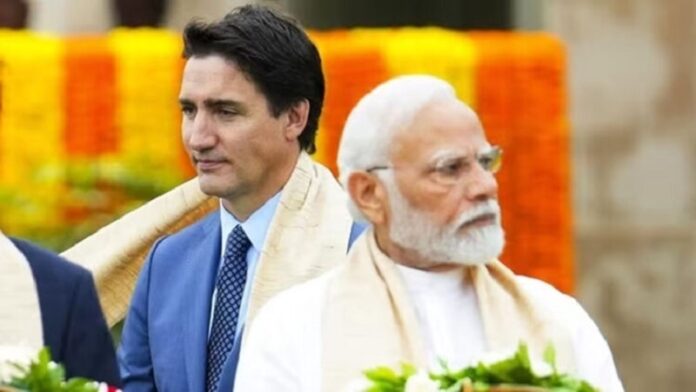Paromita Das

GG News Bureau
New Delhi, 14th October. The diplomatic relationship between Bharat and Canada has entered a turbulent phase, marked by Prime Minister Justin Trudeau’s allegations against the Bharatiya government concerning the killing of Hardeep Singh Nijjar, a Canadian-based Khalistani separatist. The Modi government has expressed strong displeasure over these allegations, asserting that Canada cannot make unsubstantiated charges against Bharat while turning a blind eye to anti-Bharat activities on its soil.
The Background of the Controversy
Nijjar, designated a terrorist by Bharat in 2020, was shot dead on June 18, 2023, an incident that has escalated into a serious diplomatic row. During a recent meeting on the sidelines of the ASEAN Summit in Vientiane, Laos, Trudeau accused Bharat of involvement in Nijjar’s death, a claim that Bharat categorically rejected as “absurd” and “motivated.” The Bharatiya government contends that there are discrepancies between Trudeau’s allegations and the ongoing investigation by the Royal Canadian Mounted Police (RCMP), which is still examining the circumstances surrounding the murder.
Following the meeting, the Bharatiya government conveyed its position to high-ranking Canadian officials, emphasizing that Canada must refrain from politicizing its investigative processes. Bharat highlighted that directing investigative agencies based on political agendas is a violation of legal principles. This assertion underscores a critical aspect of the diplomatic disagreement: Bharat’s insistence on treating allegations with due process and substantiated evidence.
Diplomatic Dynamics
The Modi government’s response has been characterized by a call for accountability. Bharat demands that Canada take verifiable actions against the Khalistani activities that threaten Bharat’s sovereignty and security. The Indian Ministry of External Affairs has clearly stated that the way forward for improved bilateral relations is for Canada to address and act against these anti-Bharat elements within its jurisdiction.
Trudeau’s approach appears to be influenced by domestic political considerations, especially as he faces a public inquiry into allegations of foreign interference in Canadian elections. His framing of the conversation with Modi as a “brief exchange” indicates an attempt to maintain a stance of political accountability, albeit at the potential cost of deteriorating international relations with a major player like Bharat.
Conclusion
The ongoing diplomatic tussle between Bharat and Canada represents a significant challenge to bilateral relations, with potential implications for regional stability and international diplomacy. The Modi government’s strong stance against unsubstantiated allegations from Canada reflects a broader trend of nations becoming increasingly assertive in protecting their sovereignty in the face of external pressures.
As this situation unfolds, it is crucial for both nations to engage in dialogue rooted in mutual respect and understanding. For Canada, addressing the concerns raised by Bharat could pave the way for more constructive relations, while for Bharat, it remains vital to assert its position against any form of external interference that undermines its national integrity.
The Modi government’s reaction to the allegations against Bharat is justified. Countries must uphold the principles of sovereignty and respect in international relations. Canada’s allegations not only challenge these principles but also risk escalating tensions unnecessarily. For a fruitful relationship to flourish, both countries need to engage in transparent dialogue, focusing on mutual interests rather than political gains. Canada should act decisively against anti-Bharat activities to foster trust and cooperation. As the world becomes increasingly interconnected, diplomatic relations grounded in truth and integrity are paramount for global peace and stability.




